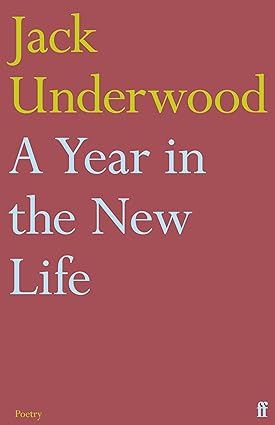A Year in the New Life

SHORTLISTED FOR THE T.S. ELIOT PRIZE 2021
POETRY BOOK SOCIETY RECOMMENDATION
Jack Underwood’s poetry debut, Happiness (2015), was celebrated for its unconventional and daring tone: ‘conversational, arresting . . . weird, singular’ (Guardian). Such qualities are on accomplished display in this anticipated new collection, as the poems mature and move on to a wide range of preoccupations, including imminent societal collapse and public unrest; the limits, myths and complexities of masculinity and fatherhood; and uncanny, often amusing scenarios, such as serving drinks to a gathering of fifteen babies or group kissing in Empathy Class.
Throughout, incongruous and domestic subjects realign in skewed lyrics and thought experiments, intimately expressed in ‘a new language / of the familiar’ (‘The Landing’). All is presented with a generosity and tenderness that makes the poet so unmistakable – and indispensable for the strange times in which we live.
‘Jack Underwood has developed an utterly clear lyric that rebukes moral obviousness, drives against false certainty. It’s as refreshing as it is instructive . . . Underwood has become one of my favorite poets.’ Kaveh Akbar
‘I was done in by these poems, but I really lived as I read them; each one holding life and time in a balletics of stress and flow.’ Holly Pester
“Jack Underwood’s poems are exceptional in how they surrender to their own music, each one a kind of expertly controlled free-fall. In this tough and tender time, we need these poems of tenderness, of toughness, and of time.” — Natalie Shapero
“The glorious abundance of Jack’s wayward absurdism and imagism creates intellectual plot-points felt like dreams, a way to think about logic in a different way, a way to think about things and people and life in a different way, which is the intention of poetry.” — Rachael Allen
“Jack Underwood demonstrates in A Year in the New Life that he’s one of the most innovative imagists and thinkers writing in the English language.” — Anthony Anaxagorou